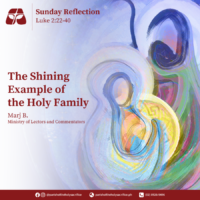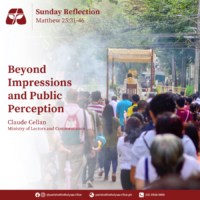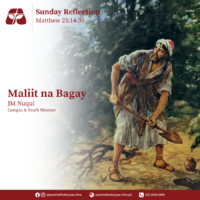Sunday Gospel Reflection
Third Sunday of Lent
Luke 13:1-9 | March 20, 2022
YHWH: The Illogical God
JM Nuqui – Campus Minister
At some point in our lives, we’ve encountered or known people sharing about that black sheep in the family or perhaps even in our own family stories. Nandyan yung anak sa pamilya na, hanggang sa paglaki, ay nakaasa pa rin sa mga magulang. Sa ibang pamilya, reklamo at pabigat yung anak na wala pa ring trabaho sa loob ng napakaraming taon. O di kaya yung kapatid na hindi nakatapos ng pag-aaral dahil nabarkada, nalulong sa mga bisyo, o nagkaroon ng anak sa murang edad. But despite of and in spite these reasons, we also hear a common resounding voice from the parents of these so-called black sheep. “Hayaan niyo na, napagsasabihan at napapakinabangan naman sa mga gawaing bahay.” “Sino ang mag-aalaga diyan kung hindi kami?” And the most striking, difficult to comprehend, and touching lines parents utter, “Naawa kami sa kapatid niyo eh. Hindi namin siya matiis. Hindi namin kayo kayang tiisin.”
My dear brothers and sisters, we hear in the readings what seems to be a very disturbing and illogical God. Human experience tells us that hatred, vengeance, and unforgiveness are our impulse and response to infidelity and transgressions. Ngunit lahat ng kabaligtaran ng mga ito ang ipinakita ng Diyos sa atin. We hear in the first reading God’s mercy and promise of constant presence to the Israelites despite their continuous infidelity. And we all know the ending of the story. Sa kabila ng kanilang pagkakasala, the promised land just keeps coming back to them. Sa kabila ng paulit-ulit na pagkakasala ng mga Israelita sa Diyos, ay siya ring paulit-ulit na pagpapatawad ng Diyos.
Sa mga magsasaka, plantito, at plantita, siguro nagtataka kayo sa naging tugon ng gardener sa Ebanghelyo. The fig tree wasn’t bearing any fruit for years. The owner wanted to cut it down for it had no use. But the patient gardener requested to give it another chance and promised to cultivate the soil and take care of it. Nasa tamang pag-iisip ba yung gardener na yun? Hindi na nga nagbubunga eh. Halos walang kwenta. Pero pinili pa ring bigyan ng pagkakataon, alagaan, at mahalin. Isn’t this reminiscent of the same images of our God in the next chapters of Luke? The seemingly illogical shepherd leaving the 99 for that one lost sheep. The crazy woman who turns her house upside-down to look for the missing coin. The prodigal father embracing once again his sons after everything they’ve done to him. Illogical. Crazy. But pure love. Always pure and unconditional love.
God revealed Himself as YHWH to Moses. I am who am. But some biblical scholars translate this tetragram YHWH to “I will be present as the one who will be there.” YHWH, pronounced without the vowels, sounds like breathing. YH(inhale) – WH (exhale) The baby’s first cry is a praise for God. Our last breath is still a call for God. In joys and triumphs, sadness and difficulties, even in the regret for all our failings, we give a deep sigh, a deep breathing—at sa kada hinga, kasa-kasama natin ang Diyos. YHWH. Palaging kasama ang Diyos.
The black sheep isn’t just the people around; sometimes, it’s also within us. We are black sheep in need of God’s constant guidance and support. At buti na lang may Diyos tayo na palaging nananatili sa tabi natin. A God who never gives up on us. A God who patiently walks with us. A God who always remains. Kahit kailan hindi ipinagdamot ng Diyos ang Kanyang kapatawaran sa atin. Kahit kailan hindi binawi ng Diyos ang pag-ibig Niya sa atin. And we imagine God, our Father, who tenderly says, “Naawa ako sa mga anak ko. Hindi ko sila kayang iiwan. Hindi ko sila kayang tiisin.”


